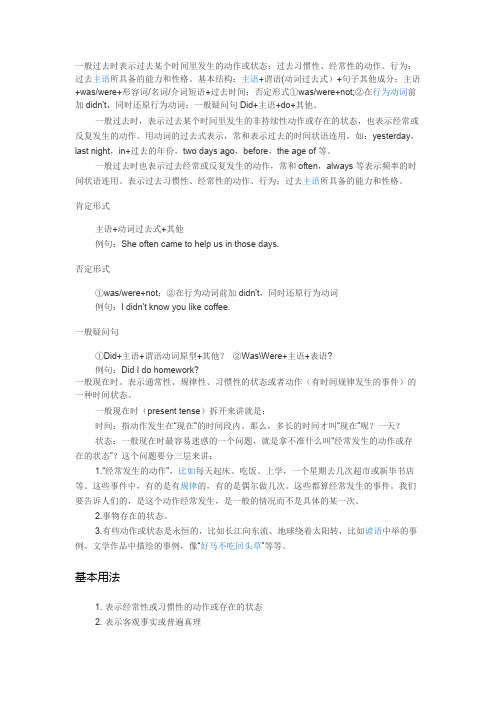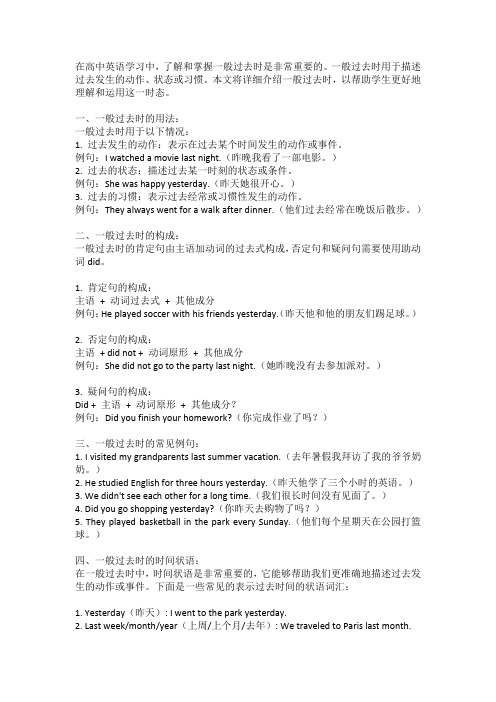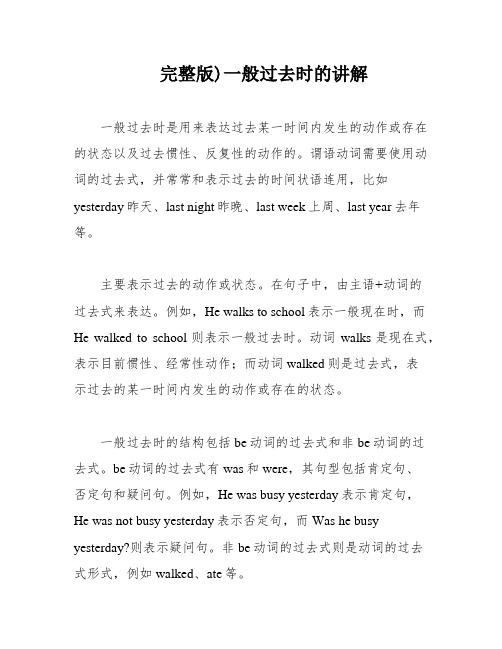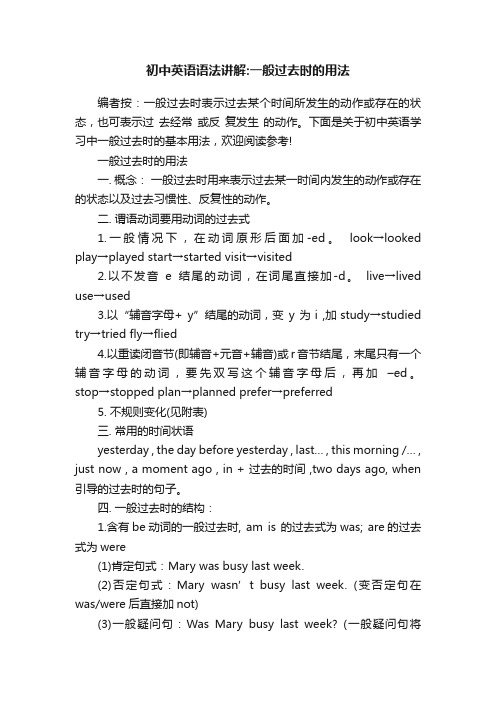一般过去时表示过去个时间发生的动作或存在的状态(终审稿)
英语一般过去时语法知识归纳总结

一般过去时语法知识一般过去时表示过去某个时间发生的动作或状态;过去习惯性、经常性的动作、行为;主语在过去时间段所具备的能力和性格。
一般过去时句子最明显的现象就是常由表达过去时间的副词、副词短语或从句来界定。
“过去”的概念并不仅指如“yesterday, last week, ……”等,实际上...“.非.........”.,亦即...“.与现在对立的过去现在的以前..”.形成对立,..........”.,哪怕是...............“.现在............”.,只要所要表达的时间与说话时的....“.过了说话时间的几分钟之前就必须使用一般过去时来表达。
..............例如:He was here only a few minutes ago. 仅仅几分钟前他还在这里。
I came home just now. 我刚回到家。
“this + 时间,today”等时间副词常用于修饰一般现在时,但是只要.......”.......“.与说话时的现在..句子的本意是对立,..必须使用一般过去时。
....,也..........例如:...即使句子中有.....”.等.时间副词......“.th..i.s. + .时间,...todayI got up very early this morning. 今天早晨我起床很早。
He was late for school again today. 今天他又迟到了。
强化理解:1. 一般过去时表示在过去某个特定时刻或时期所发生的事情,也可以表示过去习惯性、经常性的动作。
一般过去时只说明过去的事情...........。
..............,.不强调动作对现在的影响I had a word with Julia this morning. 今天早晨,我跟朱丽亚说了几句话。
He smoked many cigarettes a day until he gave up. 他没有戒烟的那阵子,抽烟抽得可凶了。
一般过去时表示过去某个时间里发生的动作或状态

一般过去时表示过去某个时间里发生的动作或状态;过去习惯性、经常性的动作、行为;过去主语所具备的能力和性格。
基本结构:主语+谓语(动词过去式)+句子其他成分;主语+was/were+形容词/名词/介词短语+过去时间;否定形式①was/were+not;②在行为动词前加didn't,同时还原行为动词;一般疑问句Did+主语+do+其他。
一般过去时,表示过去某个时间里发生的非持续性动作或存在的状态,也表示经常或反复发生的动作。
用动词的过去式表示,常和表示过去的时间状语连用,如:yesterday,last night,in+过去的年份,two days ago,before,the age of等。
一般过去时也表示过去经常或反复发生的动作,常和often,always等表示频率的时间状语连用。
表示过去习惯性、经常性的动作、行为;过去主语所具备的能力和性格。
肯定形式主语+动词过去式+其他例句:She often came to help us in those days.否定形式①was/were+not;②在行为动词前加didn't,同时还原行为动词例句:I didn't know you like coffee.一般疑问句①Did+主语+谓语动词原型+其他?②Was\Were+主语+表语?例句:Did I do homework?一般现在时。
表示通常性、规律性、习惯性的状态或者动作(有时间规律发生的事件)的一种时间状态。
一般现在时(present tense)拆开来讲就是:时间:指动作发生在“现在”的时间段内。
那么,多长的时间才叫“现在”呢?一天?状态:一般现在时最容易迷惑的一个问题,就是拿不准什么叫“经常发生的动作或存在的状态”?这个问题要分三层来讲:1.“经常发生的动作”,比如每天起床、吃饭、上学,一个星期去几次超市或新华书店等。
这些事件中,有的是有规律的,有的是偶尔做几次。
英语一般过去时语法知识点

英语一般过去时语法知识点英语一般过去时(Simple Past Tense)是表示过去某个时间发生或存在的动作或状态的一种时态。
以下是英语一般过去时的语法知识点:1. 句子结构:主语+ 动词过去式+ 其他成分。
2. 动词过去式的构成:- 一般情况下,直接在动词原形后面加-ed。
例如:play →played,watch →watched,want →wanted。
- 以不发音的字母“e”结尾的动词,在加-ed前先去掉“e”。
例如:live →lived,change →changed。
- 以辅音字母+y结尾的动词,将y变为i再加-ed。
例如:study →studied,carry →carried。
- 一些不规则动词的过去式需要记忆,例如:go →went,eat →ate,see →saw,do →did。
3. 动词过去式的否定和疑问形式:- 否定形式:主语+ did not + 动词原形+ 其他成分。
缩写为didn't。
例如:I didn't play tennis yesterday.- 疑问形式:Did + 主语+ 动词原形+ 其他成分例如:Did you watch the movie last night?4. 一般过去时的时间状语:昨天(yesterday)、上个月(last month)、去年(last year)等表示过去某个具体时间的时间状语。
5. 一般过去时的用法:- 表示过去某个具体时间发生的动作或状态。
例如:I went to the beach yesterday.- 表示过去一段时间内发生的动作或状态。
例如:I lived in London for two years.- 表示过去习惯性的动作或状态。
例如:When I was a child, I always played with my friends.以上就是英语一般过去时的语法知识点。
记得多加练习,熟练掌握一般过去时的用法。
高中英语语法一般过去时详细讲解

在高中英语学习中,了解和掌握一般过去时是非常重要的。
一般过去时用于描述过去发生的动作、状态或习惯。
本文将详细介绍一般过去时,以帮助学生更好地理解和运用这一时态。
一、一般过去时的用法:一般过去时用于以下情况:1. 过去发生的动作:表示在过去某个时间发生的动作或事件。
例句:I watched a movie last night.(昨晚我看了一部电影。
)2. 过去的状态:描述过去某一时刻的状态或条件。
例句:She was happy yesterday.(昨天她很开心。
)3. 过去的习惯:表示过去经常或习惯性发生的动作。
例句:They always went for a walk after dinner.(他们过去经常在晚饭后散步。
)二、一般过去时的构成:一般过去时的肯定句由主语加动词的过去式构成,否定句和疑问句需要使用助动词did。
1. 肯定句的构成:主语+ 动词过去式+ 其他成分例句:He played soccer with his friends yesterday.(昨天他和他的朋友们踢足球。
)2. 否定句的构成:主语+ did not + 动词原形+ 其他成分例句:She did not go to the party last night.(她昨晚没有去参加派对。
)3. 疑问句的构成:Did + 主语+ 动词原形+ 其他成分?例句:Did you finish your homework?(你完成作业了吗?)三、一般过去时的常见例句:1. I visited my grandparents last summer vacation.(去年暑假我拜访了我的爷爷奶奶。
)2. He studied English for three hours yesterday.(昨天他学了三个小时的英语。
)3. We didn't see each other for a long time.(我们很长时间没有见面了。
一般过去时_小学六年级英语

一般过去时讲解一. 概念一般过去时表示过去某一时间发生的动作或存在的状态。
常和yesterday,last week(year),three days(weeks) ago,in 2003等时间状语连用。
二.一般过去时有下面三种用法:1.表示过去的动作或状态:I bought the hat yesterday.昨天我买了这顶帽子。
He was at school last Monday.上星期一他在上学。
2.表示过去的习惯动作:When he was at school, he wrote a dairy every day.他上学时,每天写一篇日记。
I used to get up early.我以前习惯早起。
注:"used to+动词原形"表示过去某一段时间内有规律的习惯。
3.表示过去发生的一连串的动作:The students got up early in the morning, did their morning exercise, fetched water, swept the floor and then studied English.学生们一早起来,做早操,打水,扫地,然后学英语。
三. 构成(1)主语+be动词(was,were)+其它。
当主语为第一、三人称单数时,be动词用was,主语为其它人称时,be动词一律用were。
如:I(He,She) was in Grade 5 last year.They were students two years ago.(2) 主语+行为动词过去式(无人称和数的变化)。
如:We played football yesterday. Mr Li went to Shanghai last Sunday.3.变化形式:A.一般在动词词尾加ed。
例如:play—played clean—cleaned visit—visitedB.动词末尾字母是e的,在e后直接加d。
完整版)一般过去时的讲解

完整版)一般过去时的讲解一般过去时是用来表达过去某一时间内发生的动作或存在的状态以及过去惯性、反复性的动作的。
谓语动词需要使用动词的过去式,并常常和表示过去的时间状语连用,比如yesterday昨天、last night昨晚、last week上周、last year去年等。
主要表示过去的动作或状态。
在句子中,由主语+动词的过去式来表达。
例如,He walks to school表示一般现在时,而He walked to school则表示一般过去时。
动词walks是现在式,表示目前惯性、经常性动作;而动词walked则是过去式,表示过去的某一时间内发生的动作或存在的状态。
一般过去时的结构包括be动词的过去式和非be动词的过去式。
be动词的过去式有was和were,其句型包括肯定句、否定句和疑问句。
例如,He was busy yesterday表示肯定句,He was not busy yesterday表示否定句,而Was he busy yesterday?则表示疑问句。
非be动词的过去式则是动词的过去式形式,例如walked、ate等。
需要注意的是,There is (are)的句型用于一般过去时需要把is、are变为它们的过去式,即There was (were)。
否定句的结构和现在时一样,在be动词过去式(was、were)后面加上not即可,而was not和were not则通常使用缩写形式wasn’t和weren’t。
一般是在词尾加上-ed,如play-played,watch-watched等。
但也有一些规则动词需要变化,如go-went,have-had等。
I wasn’t busy the other day。
A few days ago。
I had somefree time.Was it raining in Beijing yesterday?Yes。
it was.No。
一般过去时用法及概念

一般过去时的用法及概念在英语语法中,一般过去时是一个重要的时间表达方式。
它主要用于描述过去发生的事情,或者在过去某个特定时间点完成的动作。
理解和掌握一般过去时的用法和概念对于提高英语水平具有重要意义。
一、一般过去时的概念一般过去时是一种动词时态,表示在过去某个时间或时间段内发生的动作或存在的状态。
这个时态的主要标志是动词的一般过去式形式,即动词原形后面加-ed。
二、一般过去时的用法1. 描述过去的事实或情况:例如,“Yesterday, I went to the park.”(昨天,我去了公园。
)2. 表示过去习惯性的动作:例如,“When I was a child, I always played football with my friends after school.”(当我还是个孩子的时候,放学后我总是和朋友们一起踢足球。
)3. 用于叙述故事或讲述过去的历史事件:例如,“In 1969, Neil Armstrong walked on the moon for the first time in human history.”(1969年,尼尔·阿姆斯特朗首次在人类历史上在月球上行走。
)三、一般过去时的构成一般过去时通常由主语+动词的一般过去式+宾语组成。
动词的一般过去式是在动词原形的基础上加上-ed。
但需要注意的是,有些不规则动词的过去式形式需要特殊记忆,例如go的过去式是went,eat的过去式是ate等。
四、一般过去时的否定句和疑问句在一般过去时的否定句中,我们使用助动词did not(didn't)+动词原形。
例如,“I didn't eat breakfast this morning.”(今天早上我没有吃早餐。
)在一般过去时的疑问句中,我们同样使用助动词did,将did提到主语之前。
例如,“Did you go to the party last night?”(你昨晚去参加聚会了吗?)。
初中英语语法讲解:一般过去时的用法

初中英语语法讲解:一般过去时的用法编者按:一般过去时表示过去某个时间所发生的动作或存在的状态,也可表示过去经常或反复发生的动作。
下面是关于初中英语学习中一般过去时的基本用法,欢迎阅读参考!一般过去时的用法一. 概念:一般过去时用来表示过去某一时间内发生的动作或存在的状态以及过去习惯性、反复性的动作。
二. 谓语动词要用动词的过去式1.一般情况下,在动词原形后面加-ed。
look→looked play→played start→started visit→visited2.以不发音e结尾的动词,在词尾直接加-d。
live→lived use→used3.以“辅音字母+ y”结尾的动词,变y 为i ,加study→studied try→tried fly→flied4.以重读闭音节(即辅音+元音+辅音)或r音节结尾,末尾只有一个辅音字母的动词,要先双写这个辅音字母后,再加–ed。
stop→stopped plan→planned prefer→preferred5. 不规则变化(见附表)三. 常用的时间状语yesterday , the day before yesterday , last… , this morning /… , just now , a moment ago , in + 过去的时间 ,two days ago, when 引导的过去时的句子。
四. 一般过去时的结构:1.含有be动词的一般过去时, am is 的过去式为was; are的过去式为were(1)肯定句式:Mary was busy last week.(2)否定句式:Mary wasn’t busy last week. (变否定句在was/were后直接加not)(3)一般疑问句:Was Mary busy last week? (一般疑问句将was/were动词提至句首)Yes, she was. No, she wasn’t(4)特殊疑问句: How was Mary last week?注:在这种构成中,be动词有人称和数的变化,即要根据主语选用was / were。
- 1、下载文档前请自行甄别文档内容的完整性,平台不提供额外的编辑、内容补充、找答案等附加服务。
- 2、"仅部分预览"的文档,不可在线预览部分如存在完整性等问题,可反馈申请退款(可完整预览的文档不适用该条件!)。
- 3、如文档侵犯您的权益,请联系客服反馈,我们会尽快为您处理(人工客服工作时间:9:00-18:30)。
一般过去时表示过去个时间发生的动作或存在的状态TPMK standardization office【 TPMK5AB- TPMK08- TPMK2C- TPMK18】1.一般过去时表示过去某个时间发生的动作或存在的状态,常和表示过去的时间状语连用。
一般过去时也表示过去经常或反复发生的动作感谢。
2.Be动词在一般过去时中的变化:⑴am 和is在一般过去时中变为was。
(was not=wasn’t)⑵are在一般过去时中变为were。
(were not=weren’t)⑶带有was或were的句子,其否定、疑问的变化和is, am, are一样,即否定句在was或were后加no t,一般疑问句把was或were调到句首。
3.句中没有be动词的一般过去时的句子否定句:didn’t +动词原形,如:Jim didn’t go home yesterday.一般疑问句:在句首加did,句子中的动词过去式变回原形。
如:Did Jim go home yesterday?特殊疑问句:⑴疑问词+did+主语+动词原形?如: What did Jim do yesterday?⑵疑问词当主语时:疑问词+动词过去式?如:Who went to home yesterday?动词过去式变化规则:1.一般在动词末尾加-ed,如:pull-pulled, cook-cooked2.结尾是e加d,如:taste-tasted3.末尾只有一个元音字母和一个辅音字母的重读闭音节,应双写末尾的辅音字母,再加-ed,如:st op-stopped4.以“辅音字母+y”结尾的,变y为i,再加-ed,如:study-studied5.不规则动词过去式:am,is-was, are-were, do-did, see-saw, say-said, give-gave, get-got, go-went, come-came, have-had, eat-ate, take-to ok, run-ran, sing-sang, put-put, make-made, read-read, write-wrote, draw-drew, drink-drank, fly-flew, ride-rode, speak-s poke, sweep-swept, swim-swam, sit-sat过去时练习写出下列动词的过去式is\am_________ fly_______ plant________ are ________drink_________ play_______ go________ make ________does_________ dance________ worry________ ask _____taste_________ eat__________ draw________ put ______throw________ kick_________ pass_______ do ________Be动词的过去时练习(1)Name ____________ No. ______ Date __________一、用be动词的适当形式填空1. I _______ at school just now.2. He ________ at the camp last week.3. We ________ students two years ago.4. They ________ on the farm a moment ago.5. Yang Ling ________ eleven years old last year.6. There ________ an apple on the plate yesterday.7. There ________ some milk in the fridge on Sunday.8. The mobile phone _______ on the sofa yesterday evening.二、句型转换1. It was exciting.否定句:________________________________________________ 一般疑问句:____________________________________________ 肯、否定回答:__________________________________________ 2. All the students were very excited.一般疑问句:____________________________________________肯、否定回答:__________________________________________3. They were in his pocket.否定句:________________________________________________一般疑问句:____________________________________________肯、否定回答:__________________________________________Be动词的过去时练习(2)Name ____________ No. ______ Date __________一、用be动词的适当形式填空1. I ______ an English teacher now.2. She _______ happy yesterday.3. They _______ glad to see each other last month.4. Helen and Nancy ________ good friends.5. The little dog _____ two years old this year.6. Look, there ________ lots of grapes here.7. There ________ a sign on the chair on Monday..8. Today _____ the second of June. Yesterday ______ the first of June. It _____ Children’s Day. All the students ______ very excited.二、句型转换1. There was a car in front of the house just now.否定句:________________________________________________一般疑问句:____________________________________________肯、否定回答:__________________________________________三、中译英1.我的故事书刚才还在手表旁边。
___________________________________________________________ 2.他们的外套上个礼拜放在卧室里了。
___________________________________________________________ 3.一会以前花园里有两只小鸟。
___________________________________________________________ 行为动词的过去时练习(1)Name ____________ No. ______ Date __________一、用行为动词的适当形式填空1. He _________ (live) in Wuxi two years ago.2. The cat ________ (eat) a bird last night.3. We _______ (have) a party last Halloween.4. Nancy ________ (pick) up oranges on the farm last week.5. I ________ (make) a model ship with Mike yesterday.6. They ________ (play) chess in the classroom last PE lesson.7. My mother _______ (cook) a nice food last Spring Festival.8. The girls ________ (sing) and _______ (dance) at the party.二、句型转换1. Su Hai took some photos at the Sports day.否定句:________________________________________________ 一般疑问句:____________________________________________ 肯、否定回答:__________________________________________2. Nancy went to school early.否定句:________________________________________________一般疑问句:____________________________________________肯、否定回答:__________________________________________3. We sang some English songs.否定句:________________________________________________一般疑问句:____________________________________________肯、否定回答:__________________________________________行为动词的过去时练习(2)Name ____________ No. ______ Date __________一、用be动词的适当形式填空1. I ______ (watch) a cartoon on Saturday.2. Her father _______ (read) a newspaper last night.3. We _________ to zoo yesterday, we _____ to the park. (go)4. ______ you _______ (visit) your relatives last Spring Festival?5. ______ he _______ (fly) a kite on Sunday Yes, he ______.6. Gao Shan _______ (pull) up carrots last National Day holiday.7. I ____________ (sweep) the floor yesterday, but my mother ______.8. What ______ she _______ (find) in the garden last morning She __________ (find) a beautiful butterfly.二、句型转换1. They played football in the playground.否定句:________________________________________________一般疑问句:____________________________________________肯、否定回答:__________________________________________三、中译英1. 格林先生去年住在中国。
